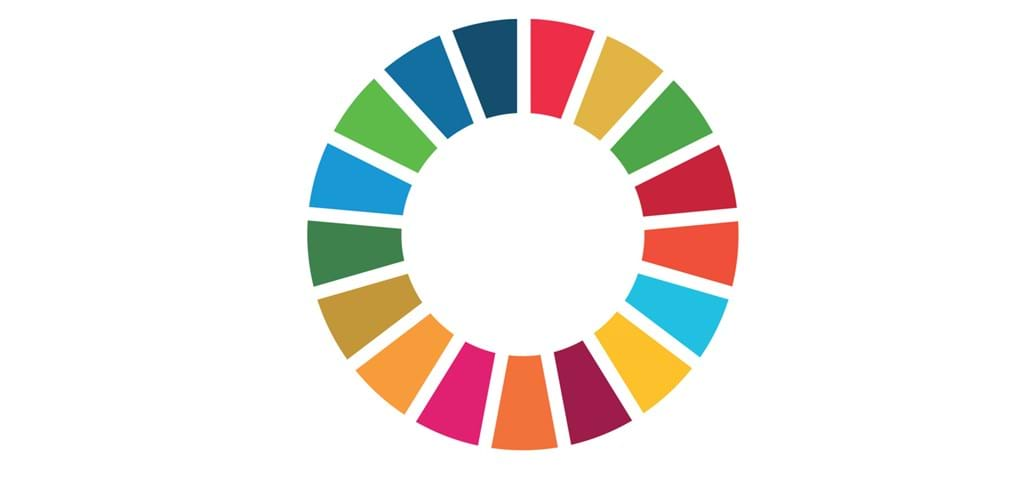
SKIOLD and the UN Sustainable Development Goals
As an established worldwide pioneer, SKIOLD strives to elevate efficiency and profitability within the agricultural landscape.
Grounded in a Danish heritage that goes back to 1877, our legacy is enriched with groundbreaking, top-tier solutions designed to cater to the grain, seed, feed, and pig industries. Our sharp focus on technology and a customer-oriented approach empower farmers and agricultural enterprises worldwide by offering custom-made solutions that bolster their productivity and sustainability.
Envisioned in 2015, the United Nations Sustainable Development Goals (SDGs) serve as a blueprint of 17 global goals striving for a superior, sustainable future for all. They address critical global concerns including poverty, inequality, and climate change, setting ambitious targets to be met by 2030. These goals create a harmonious balance between the three dimensions of sustainable development: economic, social, and environmental, while interconnecting with each other.
At SKIOLD, we align our commitment to the SDGs as a reflection of our dedication towards global responsibilities. Recognizing the essential role agriculture plays in multiple SDGs, we've incorporated the essence of these goals into our strategic vision and operational framework. Our commitment is evident in our promotion of sustainable farming practices enhancing food security (SDG 2), driving industry innovation (SDG 9), advocating for responsible consumption and production (SDG 12), and our battle against the repercussions of climate change through environmentally friendly solutions (SDG 13). We are steadfast in our mission to advance the journey towards sustainable agriculture.
This article will delve into how SKIOLD's initiatives and activities underpin the UN's Sustainable Development Goals, showcasing the positive impacts of our actions on environmental, social, and economic sustainability in the agricultural domain.
SKIOLD and Environmental Sustainability
Our unwavering dedication towards sustainable farming practices underlines SKIOLD's deep respect for the environment and cognizance of the dire need to address climate change and mitigate environmental impacts. This commitment harmonizes with several United Nations Sustainable Development Goals pertaining to environmental sustainability, including SDG 7 (Affordable and Clean Energy), SDG 12 (Responsible Consumption and Production), and SDG 13 (Climate Action).
As part of our pursuit of SDG 7, we are actively transitioning towards cleaner and more economical energy solutions in both our operations and products. We fully comprehend that energy efficiency stands as a fundamental element of sustainable farming and is pivotal to curtailing the environmental footprint of agricultural activities. As evidence, SKIOLD's grain handling systems and digital farming solutions are engineered to optimize energy usage, thereby reducing waste and endorsing more sustainable agricultural methodologies.
SDG 12 is another goal that resonates with our operational philosophy. We advocate for responsible consumption and production in the primary sector through optimal cleaning, storage, and management of raw materials. This approach curbs waste in the food chain and encourages local food production, consequently diminishing the environmental impact. Case in point, our feed milling equipment optimizes feed conversion efficiency, thereby reducing waste and bolstering productivity.
In line with SDG 13, we at SKIOLD take proactive steps to confront climate change by innovating solutions and technologies that augment resource efficiency and decrease energy consumption in agricultural production. Our advanced climate control systems designed for pig farms, for instance, effectively balance ventilation, heating, and cooling in stables, thus lowering energy consumption and mitigating greenhouse gas emissions.
SKIOLD's substantial contribution towards environmental sustainability is evident through our alignment with these SDGs. Our efforts not only encourage sustainable practices within our operations but also empower farmers and other clients to integrate these sustainable methodologies into their agricultural activities. By offering environmentally-friendly solutions, we at SKIOLD create a positive ripple in the industry and contribute meaningfully to the global war against climate change.
SKIOLD and Social Sustainability
In harmony with our endeavors in environmental sustainability, SKIOLD also makes significant strides towards social sustainability, aligning our operations and strategies with several of the UN's Sustainable Development Goals. This alignment encompasses SDG 1 (No Poverty), SDG 2 (Zero Hunger), SDG 3 (Good Health and Well-being), SDG 4 (Quality Education), SDG 8 (Decent Work and Economic Growth), SDG 10 (Reduced Inequalities), and SDG 16 (Peace, Justice, and Strong Institutions).
As a proactive combatant against poverty (SDG 1), we at SKIOLD contribute to forging local, sustainable employment opportunities in the agricultural and livestock sectors. We provide both technology and training aimed at boosting productivity and enhancing resource accessibility, thereby underpinning the rural economy and contributing to poverty reduction in emerging regions.
In the context of SDG 2 (Zero Hunger), we leverage our influential role in the agricultural industry to champion universal access to safe and nutritious food. By delivering solutions that amplify agricultural productivity and livestock farming, SKIOLD contributes to food security and join hands in the global effort to eradicate hunger.
Aligned with SDG 3 (Good Health and Well-being), we put a strong emphasis on responsible animal food production, where the welfare and conditions of the animals are instrumental in the creation of quality food products. By equipping farmers with the necessary tools and knowledge that promote health and safety in livestock production, we are making a meaningful contribution to the global initiative to improve health outcomes.
In line with SDG 4 (Quality Education), we lend our support to educational initiatives and provide training in sustainable agriculture. Through practical learning and technological knowledge sharing, we empower farmers, enriching lifelong learning opportunities and fostering sustainable practices.
Under SDG 8 (Decent Work and Economic Growth), we at SKIOLD uphold high standards for ethical labor practices and advocate for fair trade. Our company drives economic growth by focusing on value addition through advanced technologies that encourage development and establish fitting working conditions.
In response to SDG 10 (Reduced Inequalities), we actively collaborate on projects across various developing countries, aiding in augmenting income levels and self-sufficiency for some of the world's most impoverished populations. By ensuring equal opportunities and resources, we actively contribute to reducing inequalities.
In congruence with SDG 16 (Peace, Justice, and Strong Institutions), SKIOLD vehemently opposes all forms of exploitation, abuse, and human trafficking. We promote non-discriminatory legislation and contribute to the establishment of peaceful and inclusive societies.
Through these commitments, SKIOLD illustrates our deep dedication to the social facets of sustainability. Our mission transcends mere profit-making; it is about improving lives, enhancing well-being, and steering the entire agricultural sector towards a more equitable and inclusive future.
SKIOLD and Economic Sustainability
In conjunction with our efforts towards environmental and social sustainability, economic sustainability represents a third vital pillar within the UN Sustainable Development Goals. This aspect finds particular resonance with SDG 8 (Decent Work and Economic Growth) and SDG 9 (Industry, Innovation, and Infrastructure), where SKIOLD's contributions are notably evident.
For SDG 8 (Decent Work and Economic Growth), we embody an exemplary model of ethical business practices, promoting decent working conditions and stimulating economic growth. Our firm stance against all forms of forced and child labor, and our high standards imposed on both ourselves and our trading partners, underscore our unwavering commitment to uphold human rights within the workplace.
Furthermore, our focus is sharpened on boosting productivity via technological innovation that facilitates value creation, spurs development, and sets up wholesome working environments. This methodology extends beyond job creation, fostering decent and secure working conditions, and catalyzing sustained, inclusive, and sustainable economic progress.
Under the aegis of SDG 9 (Industry, Innovation, and Infrastructure), we are wholeheartedly committed to propelling sustainable industries forward through innovation. Our team develops digital systems that enrich industrial processes, thereby championing inclusive and sustainable industrialization. By centering on technological advancements, SKIOLD not only modernizes infrastructure and renders industries more sustainable, but we also invigorate economic development and offer solutions to environmental challenges. These innovations reverberate beyond the scope of SKIOLD's own operations, empowering the agricultural industry to metamorphose and align with the demands of the 21st century.
In conclusion, by prioritizing the promotion of decent work and economic growth, and harnessing innovation to evolve industry and infrastructure, SKIOLD is making significant strides towards economic sustainability. Our concerted efforts spotlight the critical role businesses can play in steering economic sustainability, whilst simultaneously nurturing social and environmental welfare.
Partnerships for Advancement
The attainment of the ambitious UN Sustainable Development Goals isn't a solitary endeavor. Collaboration and partnerships, as emphasized by SDG 17, are indispensable in ushering change and yielding significant results. Acknowledging this, we have taken an active role in cultivating partnerships to fulfill our sustainability objectives.
Our approach to partnerships is diverse and comprehensive. We forge synergistic relationships with various stakeholders, including farmers, food producers, aid organizations, governments, technology companies, and academic institutions. These collaborations aid in knowledge exchange, resource optimization, and maximize our overall impact.
A prime example of our successful collaborations is observable in our initiatives to boost agricultural productivity and tackle poverty. Through close collaboration with local communities, governments, and non-profit organizations, we've been able to execute solutions that create sustainable employment, augment agricultural and livestock production, and ultimately, boost local economies.
Further, we are active contributors to science, technology, and innovation by virtue of partnerships with academic institutions and research organizations. These cooperative efforts have led to the conception and dispersion of eco-friendly technologies, thereby aiding in the realization of SDGs concerning climate action and responsible consumption.
Additionally, in the sphere of public health, our partnerships with aid organizations aimed at improving health conditions in third-world countries serve as further testament to the effectiveness of strategic collaborations. These partnerships aid in providing access to essential resources, advancing educational initiatives, and making a significant contribution to public health improvement.
Moreover, in our quest for responsible consumption and production (SDG 12), we've engaged partners along the entire supply chain, encompassing farmers, processors, retailers, and consumers. Together, we work towards optimizing resource utilization, curbing waste, and encouraging local food production.
These examples highlight the instrumental role of partnerships in our journey towards accomplishing the UN SDGs. By uniting with diverse stakeholders, we at SKIOLD are able to extend our influence, prompting progress not only within our own operations but also within the broader agricultural sector and the global community. We thus demonstrate how partnerships can be utilized to expedite sustainable development and build a brighter future for all.
Closing Remarks
Reflecting upon our contributions towards the UN Sustainable Development Goals, it's evident that our commitment to sustainability transcends mere business interests. It's woven into the very fabric of our vision, shaping our operations, collaborations, and innovations. SKIOLD embodies the influential role businesses can play in cultivating a sustainable and inclusive future.
As we gaze towards the future, SKIOLD stands resolute in our commitment to sustainability and the SDGs. Our aspiration is to incessantly innovate and refine our processes and products to heighten efficiency and diminish environmental footprint. We'll persist in fostering partnerships, endorsing education, and contributing to scientific and technological progress to expedite strides towards the SDGs.
Surpassing specific objectives, SKIOLD is committed to creating a positive influence across the agricultural value chain, from field to livestock, advocating responsible conduct and sustainability. Whether it's enhancing productivity to fight poverty, assuring food safety to eliminate hunger, or optimizing resource application to endorse responsible consumption, SKIOLD consistently strives to effect a difference.
In conclusion, SKIOLD's journey towards sustainable agriculture serves as an affirmation of the transformational power businesses wield to incite change. It exemplifies how commitment, innovation, and cooperation can drive global sustainable development. As SKIOLD continues its journey, it's not only contributing towards a more sustainable world but also laying the groundwork for other businesses to integrate sustainability into their core operations.


 English
English
 Danish
Danish
 French
French
 Swedish
Swedish
 Vietnamese
Vietnamese
 Spanish
Spanish
 German
German
 English
English




